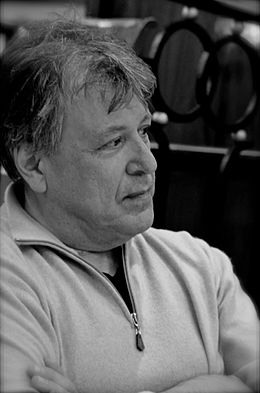Andrei Gavrilov facts for kids
Quick facts for kids
Andrei Gavrilov
|
|
|---|---|

Andrei Gavrilov, January 2017.
|
|
| Born |
Andrei Vladimirovich Gavrilov / Андрей Владимирович Гаврилов (Russian)
September 21, 1955 |
| Nationality | Swiss Russian British German |
| Education | Moscow Conservatory, Moscow |
| Occupation | Pianist |
| Years active | 1974–present |
| Parent(s) | Vladimir Gavrilov (father) Assanetta Eguiserian (mother) |
| Musical career | |
| Instruments | piano |
| Labels |
|
Andrei Gavrilov (born September 21, 1955) is a famous Russian-Swiss pianist. He is known for his amazing piano playing around the world.
Contents
A Young Piano Star
Andrei Gavrilov was born in Moscow into a family of artists. His father, Vladimir Gavrilov, was a well-known Russian painter. His mother, Assanetta Eguiserian, was also a talented pianist. She gave Andrei his very first piano lessons when he was only two years old!
In 1961, Andrei started studying at the Moscow Central Music School. He later continued his studies at the Moscow Conservatory. When he was just 18, he won the important International Tchaikovsky Competition in 1974. This made him famous worldwide. That same year, he filled in for another famous pianist, Sviatoslav Richter, at the Salzburg Festival. From 1974 to 1979, Gavrilov performed many concerts each year in major music cities around the globe.
Challenges and Comeback
In 1979, Andrei Gavrilov was at a high point in his career. A famous conductor, Herbert von Karajan, wanted to record music with him. However, Gavrilov faced a big challenge. Because he had spoken critically about the Soviet Union's government, his passport was taken away. He was also kept under house arrest, meaning he couldn't leave his home freely.
This difficult time lasted until 1984. Then, with help from Mikhail Gorbachev, Gavrilov finally received a "free passport." This allowed him to travel and perform in Western countries again. After this, he lived in London and later in Germany, where he also became a German citizen.
In 1993, Gavrilov decided to take a break from performing and recording. He felt he needed time to grow as an artist. This break, which he thought would be two years, actually lasted for eight years! During this time, he studied music deeply and explored philosophical ideas. He even lived in Fiji for six months. He also worked on improving his piano technique.
Andrei Gavrilov returned to the stage in the 2001/2002 concert season. Since 2008, he has lived in Kanton Zürich, Switzerland, with his second wife and their son.
Recordings and Teaching
Andrei Gavrilov has made many recordings throughout his career. Early on, he recorded for Melodiya. From 1977 to 1989, he worked with EMI, recording famous pieces by composers like Chopin, Scriabin, Prokofiev, Rachmaninoff, and J. S. Bach. Later, from 1991 to 1993, he recorded for Deutsche Grammophon.
In 2012, Gavrilov started giving master classes, teaching piano to students in Madrid and London. In 2013, he finished writing his three-volume autobiography. The first volume was published in 2014. He also made a new recording of Chopin's Nocturnes, which was included with his book.
Andrei Gavrilov continues to perform. In April 2013, he played and conducted three concertos in one evening in Belgrade. He also performed a similar concert in Bristol in May 2014. More recently, in 2018 and 2020, he released new recordings on his own label, "Unzipped Classical Music."
TV and Radio Appearances
Andrei Gavrilov has also appeared on TV and radio.
TV
- 1979: He performed with violinist Gidon Kremer on a TV broadcast.
- 1985: He played music in a film about the composer Handel called God Rot Tunbridge Wells!.
- 1989: He performed Rachmaninoff's Piano Concerto No. 2 with the Royal Philharmonic Orchestra in Moscow, which was broadcast by the BBC.
- 1990: He played pieces by Prokofiev and Rachmaninoff and spoke about the music on German TV.
- 2000: He performed Bach's Well-Tempered Clavier for a BBC Wales/Euroarts DVD.
- 2020: A recording of his recital in Tokyo was shared online.
Radio
- 2009: He performed works by Chopin, Prokofiev, and Scarlatti on a live radio broadcast.
Other Recordings
- 2006: Live recordings of Chopin's Nocturnes from the Lucerne Festival were released.
See also
 In Spanish: Andréi Gavrílov para niños
In Spanish: Andréi Gavrílov para niños
 | William M. Jackson |
 | Juan E. Gilbert |
 | Neil deGrasse Tyson |

